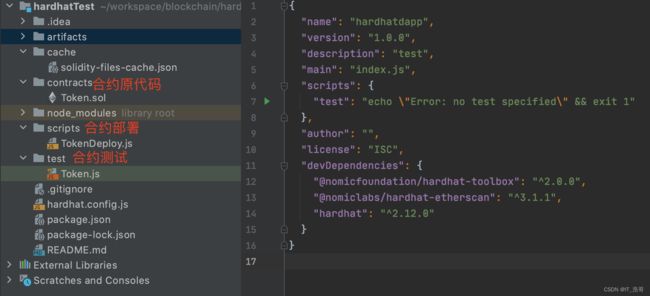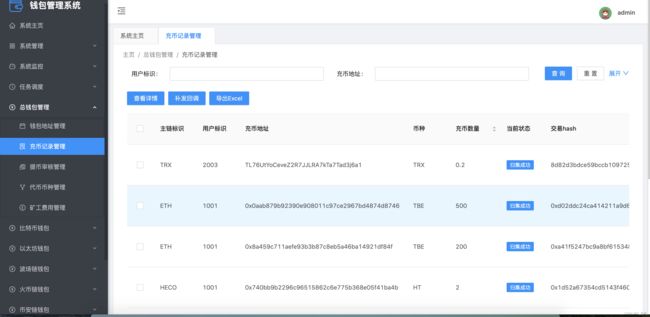Hardhat以太坊智能合约开发框架基础教程
一、Hardhat框架介绍
Hardhat是一个基于javascript和solidity的开发框架。可实现编译、部署、测试、开源和调试以太坊应用的开发环境。Hardhat是一个围绕任务和插件的概念设计的;Hardhat 的大部分功能来自插件。Chain区块链开发群593674370
二、Hardhat框架优点
1、Hardhat 拥有大量插件,并允许自定义、灵活性和可扩展性。
2、Hardhat运行同时使用ether.js和web3.js。
3、Hardhat有良好的 console.log() 调试能力;会在调试时提供代码中发生的堆栈跟踪。
4、Hardhat 提供原生Typescript支持,并且还有一个Vscode扩展,为 Vscode 编辑器添加了可靠的支持。
5、Hardhat 带有一个内置的本地以太坊网络,称为Hardhat Network,用于在本地机器上运行和部署智能合约,是一个专为开发而设计的本地以太坊网络节点。
三、哪些项目在使用Hardhat
Chainlink ;Uniswap;Aave ;SushiSwap ; ENS 等主流项目。
四、Hardhat环境搭建
1、请安装node.js 12.x及以上的版本
2、Hardhat先安装到本地。
npm install --save-dev hardhat3、先创建一个空文件夹执行安装命令;通过执行 npx hardhat 创建项目。
npx hardhat初始化后项目结构。
五、创建编译合约
1、在contracts目录下编写一个合约文件 Token.js
// SPDX-License-Identifier: MIT
pragma solidity ^0.8.8;
library SafeMath {
function add(uint256 a, uint256 b) internal pure returns (uint256) {
uint256 c = a + b;
require(c >= a, "SafeMath: addition overflow");
return c;
}
function sub(uint256 a, uint256 b) internal pure returns (uint256) {
require(b <= a, "SafeMath: subtraction overflow");
uint256 c = a - b;
return c;
}
function mul(uint256 a, uint256 b) internal pure returns (uint256) {
if (a == 0) {
return 0;
}
uint256 c = a * b;
require(c / a == b, "SafeMath: multiplication overflow");
return c;
}
function div(uint256 a, uint256 b) internal pure returns (uint256) {
// Solidity only automatically asserts when dividing by 0
require(b > 0, "SafeMath: division by zero");
uint256 c = a / b;
// assert(a == b * c + a % b); // There is no case in which this doesn't hold
return c;
}
function mod(uint256 a, uint256 b) internal pure returns (uint256) {
require(b != 0, "SafeMath: modulo by zero");
return a % b;
}
}
interface IERC20 {
function totalSupply() external view returns (uint256);
function balanceOf(address account) external view returns (uint256);
function transfer(address recipient, uint256 amount) external returns (bool);
function allowance(address owner, address spender) external view returns (uint256);
function approve(address spender, uint256 amount) external returns (bool);
function transferFrom(address sender, address recipient, uint256 amount) external returns (bool);
event Transfer(address indexed from, address indexed to, uint256 value);
event Approval(address indexed owner, address indexed spender, uint256 value);
}
abstract contract ERC20Detailed is IERC20 {
string private _name;
string private _symbol;
uint8 private _decimals;
constructor (string memory tokenName, string memory tokenSymbol, uint8 tokenDecimals) {
_name = tokenName;
_symbol = tokenSymbol;
_decimals = tokenDecimals;
}
function name() public view returns (string memory) {
return _name;
}
function symbol() public view returns (string memory) {
return _symbol;
}
function decimals() public view returns (uint8) {
return _decimals;
}
}
contract ERC20 is IERC20 {
using SafeMath for uint256;
mapping (address => uint256) private _balances;
mapping (address => mapping (address => uint256)) private _allowances;
uint256 private _totalSupply;
function totalSupply() public view returns (uint256) {
return _totalSupply;
}
function balanceOf(address account) public view returns (uint256) {
return _balances[account];
}
function transfer(address recipient, uint256 amount) public returns (bool) {
_transfer(msg.sender, recipient, amount);
return true;
}
function allowance(address owner, address spender) public view returns (uint256) {
return _allowances[owner][spender];
}
function approve(address spender, uint256 value) public returns (bool) {
_approve(msg.sender, spender, value);
return true;
}
function transferFrom(address sender, address recipient, uint256 amount) public returns (bool) {
_transfer(sender, recipient, amount);
_approve(sender, msg.sender, _allowances[sender][msg.sender].sub(amount));
return true;
}
function _transfer(address sender, address recipient, uint256 amount) internal {
require(sender != address(0), "ERC20: transfer from the zero address");
require(recipient != address(0), "ERC20: transfer to the zero address");
_balances[sender] = _balances[sender].sub(amount);
_balances[recipient] = _balances[recipient].add(amount);
emit Transfer(sender, recipient, amount);
}
function _mint(address account, uint256 amount) internal {
require(account != address(0), "ERC20: mint to the zero address");
_totalSupply = _totalSupply.add(amount);
_balances[account] = _balances[account].add(amount);
emit Transfer(address(0), account, amount);
}
function _burn(address account, uint256 value) internal {
require(account != address(0), "ERC20: burn from the zero address");
_totalSupply = _totalSupply.sub(value);
_balances[account] = _balances[account].sub(value);
emit Transfer(account, address(0), value);
}
function _approve(address owner, address spender, uint256 value) internal {
require(owner != address(0), "ERC20: approve from the zero address");
require(spender != address(0), "ERC20: approve to the zero address");
_allowances[owner][spender] = value;
emit Approval(owner, spender, value);
}
function _burnFrom(address account, uint256 amount) internal {
_burn(account, amount);
_approve(account, msg.sender, _allowances[account][msg.sender].sub(amount));
}
}
contract ERC20Template is ERC20, ERC20Detailed {
constructor() ERC20Detailed("USDT", "USDT", 18) {
_mint(msg.sender, 10000000000 * (10 ** uint256(decimals())));
}
}
2、编译合约执行 npx hardhat compile
% npx hardhat compile
Compiled 1 Solidity file successfully3、在test目录下 编写测试案例 Token.js
//Chai,这是一个断言库
const { expect } = require("chai");
describe("创建合约测试案例", function() {
it("CreateContract", async function() {
//ethers.js中的Signer 代表以太坊账户对象。 它用于将交易发送到合约和其他帐户。
// 在这里,我们获得了所连接节点中的帐户列表,在本例中节点为Hardhat Network,并且仅保留第一个帐户
const [owner, addr1, addr2] = await ethers.getSigners();
//ethers.js中的ContractFactory是用于部署新智能合约的抽象,因此此处的Token是用来实例代币合约的工厂。
const Token = await ethers.getContractFactory("ERC20Template");
//在ContractFactory上调用deploy()将启动部署,并返回解析为Contract的Promise。 该对象包含了智能合约所有函数的方法。
const hardhatToken = await Token.deploy();
//当你调用deploy()时,将发送交易,但是直到该交易打包出块后,合约才真正部署。 调用deployed()将返回一个Promise,因此该代码将阻塞直到部署完成。
await hardhatToken.deployed();
//查询代币总量
const balance = await hardhatToken.balanceOf(await owner.getAddress());
console.log("代币总量="+balance)
// 给钱包addr1转移100代币数量
await hardhatToken.transfer(await addr1.getAddress(), 100);
//查询地址addr1余额
const balanceAddr1 = await hardhatToken.balanceOf(await addr1.getAddress());
console.log("地址addr1余额="+balanceAddr1)
// 钱包addr1给钱包addr2转移100代币数量
await hardhatToken.connect(addr1).transfer(await addr2.getAddress(), 100);
const balanceAddr11 = await hardhatToken.balanceOf(await addr1.getAddress());
console.log("余额转移给addr2后地址addr1余额="+balanceAddr11)
//查询地址addr2余额
const balanceAddr2 = await hardhatToken.balanceOf(await addr2.getAddress());
console.log("地址addr2余额="+balanceAddr2)
//断言判断
expect(await hardhatToken.balanceOf(await addr2.getAddress())).to.equal(100);
});
});
执行 npx hardhat test 查看运行结果:
六、部署合约到正式网络网络
1、hardhat.config.js 在此文件里面配置 网络信息
require("@nomicfoundation/hardhat-toolbox");
require("@nomiclabs/hardhat-etherscan");
module.exports = {
networks: {
bsc: {
url: `https://bsc-dataseed1.ninicoin.io/`,
accounts: [`部署合约钱包私钥`],
},
bscTest: {
url: `https://data-seed-prebsc-2-s3.binance.org:8545/`,
accounts: [`部署合约钱包私钥`]
},
hecoTest: {
url: 'https://http-testnet.hecochain.com',
accounts: [`部署合约钱包私钥`]
}
},
etherscan: {
apiKey: {
bsc: '',
hecoTestnet: '',
}
},
solidity: "0.8.9"
};
2、在scripts目录下创建 TokenDeploy.js 文件
async function main() {
const [deployer] = await ethers.getSigners();
console.log("获取部署钱包地址:",await deployer.getAddress());
console.log("获取部署钱包地址余额:", (await deployer.getBalance()).toString());
//指定合约工程要部署的名称
const Token = await ethers.getContractFactory("ERC20Template");
const token = await Token.deploy();
await token.deployed();
console.log("部署后合约地址:", token.address);
}
main()
.then(() => process.exit(0))
.catch(error => {
console.error(error);
process.exit(1);
});
执行部署命令:npx hardhat run scripts/TokenDeploy.js --network hecoTest
% npx hardhat run scripts/TokenDeploy.js --network hecoTest
获取部署钱包地址: 0xc290436b3da897115493a1547B52783c50f0Bef3
获取部署钱包地址余额: 1138718537000000000
部署后合约地址: 0x9AdAaDb89C6968CF6C4Ef116C614EAedD314a6EEHECO测试浏览器查看验证
七、合约源代码开源
注:需要申请浏览器 apiKey配置在 hardhat.config.js文件此处。
开源执行命令,成功后就可以在浏览器上查看了。
% npx hardhat verify 0x9adaadb89c6968cf6c4ef116c614eaedd314a6ee --network hecoTest




